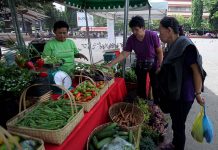The establishment of a school-based post-harvest processing facility in Malita town is gearing towards developing new and innovative local products maximizing the abundant aquaculture resources of Davao Occidental.
The Department of Trade and Industry (DTI) Davao Occidental has recently formalized a partnership with the Southern Philippines Agri-Business and Marine and Aquatic School of Technology (SPAMAST) to operationalize the latter’s expanded post-harvest processing facility.
The partnership has been sealed with the signing of a Memorandum of Agreement (MOA) and usufruct during the launching of DTI’s Shared Service Facility (SSF) Program which funded the improvement of the facility.
With a total funding of P483,000, the SSF Program provided the needed machineries and equipment such as freezer, sealer, weighing scale, oven, fish drying facility and processing table.
“The equipment will address the gap in the value chain, value adding facility, value adding activity like food processing and fish drying, to marketing,” stated Maria Joycelyn Banlasan, provincial director of DTI-Davao Occidental.
Banlasan said that the facility intends to develop new and innovative products out of fish and other aquatic and agri-fish based resources in the province, such as tilanggit (dried marinated tilapia), fermented fish, and canned/bottled fish products.
“This is still a work in progress. We can still give additional project to complete the process, and to make the products very appealing to the buyers and gain market acceptance,” she said.
She added that the facility is aligned with the thrust of SPAMAST to develop the aquaculture which is abundant in the province.
SPAMAST President Dr. Ruth Lucero said that the post-harvest processing facility would serve as a venue for students, out of school youth, micro, medium and small entrepreneurs (MSMEs) and people’s organizations to enhance their capability to process foods.
“This is open to all. So we can help improve the quality of life of the constituents in the province,” Lucero stated.
She said that identifying and developing local products can also bring pride for Davao Occidental.
The post-harvest processing facility will still be under the ownership of DTI for two years. “If managed effectively and efficiently after two years, we will then turn over the full ownership under SPAMAST,” Banlasan explained.
She hoped that SPAMAST will attract more partners to improve the facility, saying “because DTI could not make it along… We have to partner with other agencies to come up with productive products using our abundant resources in the province.” (PIA-XI/Carina L. Cayon)






